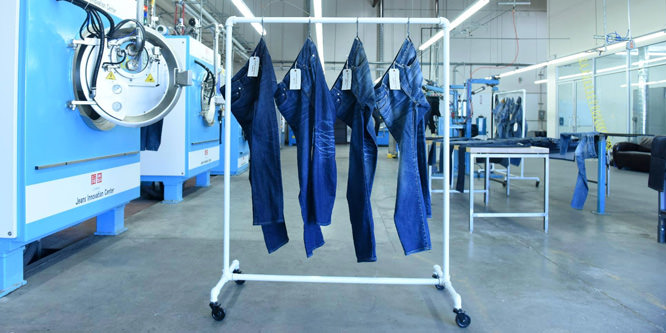
Photo: Uniqlo
Will Uniqlo find success with its denim-only concept shop?
Japanese apparel retailer Uniqlo may be going niche as it continues to seek its place in the U.S. apparel landscape. The chain is opening a new concept focused entirely on denim.
The denim-only concept shop is slated to open in Los Angeles, making it the 47th Uniqlo store in the U.S. and the ninth in the Los Angeles area, according to a press release. The shop will feature the full line of Uniqlo’s denim offerings as well as some complementary clothing.
The new concept store appears to be the next step in a strategy centered around high-end denim that began with last year’s introduction of the Denim Innovation Center, opened by Uniqlo parent company Fast Retailing. The research and development facility also in Los Angeles, purports to pursue technological advancements in such areas of denim production as the development of new materials and fit.
Locating both the new concept and the R&D facility in Los Angeles is a move intended to take advantage of the city’s reputation as a hub for high-end denim.
Uniqlo has notoriously bounced back and forth between expansion strategies in the U.S. over the last decade. Early on, Uniqlo established itself as a fashionable but affordable retailer with a single destination store in Manhattan’s Soho neighborhood and without online sales. In 2011 it shifted gears, announcing a plan to open 200 stores in the U.S. by 2020, as reported by Reuters at that time.
But after opening stores at a faster rate in suburban malls, the company backed away from the expansion, according to CNBC. The chain has recently begun closing mall locations to refocus its efforts on urban markets.
Uniqlo has made other creative moves to find a fit in the U.S. It is one of a couple of retailers that have recently tried using vending machines to sell its products in airports.
Despite its stateside difficulties, Uniqlo continues to be successful in Asia and elsewhere globally. Fast Retailing remains the third largest global specialty apparel brand and has stated that it aims to overtake Inditex, owner of Zara, as the largest.
- UNIQLO to Open Denim Concept Shop in Los Angeles – Uniqlo
- Denim Innovation Center – Uniqlo
- Can vending units help Uniqlo achieve success in the U.S.? – RetailWire
- Uniqlo starts U.S. expansion, eyes 200 stores – Reuters
- As retailers close stores, the world’s third-largest apparel player takes another run at the US – CNBC
- Uniqlo sees U.S. as land of retailing opportunity – RetailWire
Discussion Questions
DISCUSSION QUESTIONS: Do single product-targeted shops (e.g., denim-centric) make sense for apparel retailers like Uniqlo? What has Uniqlo done right and wrong, in your opinion, in its approach to the U.S. apparel market?


Does this not sound suspiciously like Gap? Wasn’t Gap great until it expanded its selection?
Denim is currently in vogue and spend is rising. In that context, this format may make sense. However, what happens next year when that trend has gone? Uniqlo doesn’t have the brand strength of Levi’s or other specialists to make such a concept work during a period of more muted demand.
With regard to Uniqlo more generally, our consumer research consistently finds that while it is wildly popular among a small group of consumers, the vast majority of American shoppers don’t find the concept appealing or interesting. In a market crowded with purveyors of basic fashion, this is hardly surprising.
Uniqlo’s business model is built around speed to market, affordable pricing, a seamless in-store shopping experience and most importantly a diversification strategy that enables their loyal customers to enjoy unique and interesting product offerings. A single product-targeted denim shop may provide short-term dividends and a new revenue stream, however, when the denim trends fall off, what is Uniqlo left with?
A visit to a Uniqlo shop is intriguing, and you tend to find products that you are unable to find elsewhere. By entering into the denim market, Uniqlo will face fierce competition, as this is a very mature category and there are far more dominant companies in this space who have the ability to flex and shift with the changing trends.
This may prove to be far more challenging for Uniqlo than they expect, and perhaps they would be better served focusing on the diversification and curated assortments that have helped retain their very loyal customers.
It doesn’t sound like Uniqlo ever had a well thought-out long-term strategy. The cultures of Asia and the U.S. are very different. There might be some short-term success with Uniqlo selling denim only, based on how well they market themselves and convince buyers they have something unique that is worth purchasing. There are too many retail apparel chains today with many of them suffering from sameness. So only selling denim does give Uniqlo an opportunity to be different but their products and shopping experience have got to “wow” the customer, and they’ll have to do it every time. So it sounds like an uphill battle. Only time will tell if this can work.
Jeans are one of the most important and most worn apparel pieces … and it’s notoriously hard to find a “perfect” fit. Sounds like Uniqlo’s specialization will fit a market need.
Why Denim? Denim is so American and Uniqlo is not an American brand, not part of its DNA. If they were to open an affordable cashmere shop, now that would be interesting.
A few years ago, Uniqlo introduced a limited-time product release called the Blue Project, a line of high-quality, stylish Japanese denim. IMO, is was some of the best denim you could buy at its price point. If anyone can innovate and bring quality denim at an affordable price, it’s Uniqlo. I believe there is room in the marketplace for another big brand niche store. Also, IMO, denim is not really a trend product.